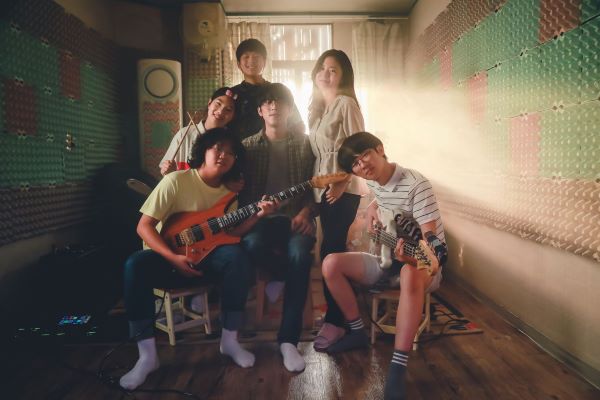Shim Chanyang’s lightweight but thoroughly charming Da Capo reaches for the same specific sweet spot of the likes of School of Rock, Sing Street or Lukas Moodysson‘s exuberant We Are the Best!. That of musical dramas that capture the sheer indefinable magic of playing music with other people; the joy, the energy, and the connections made as you function in synchronicity with your fellow musicians. While it’s less broad than Richard Linklater‘s cutesy Jack Black vehicle, and lacks the nostalgic period specificity of the others, it would require a hard heart indeed to take against it in any meaningful way.
Tae-il (Isaac Hong) returns to his hometown after years away trying and failing to become a successful musician. He reconnects with former bandmate Ji-won (the phenomenal Flamenco guitarist Haeun Jang), who is teaching at a music school. The disillusioned Tae-il becomes involved in coaching a young rock band who have entered a local music contest and rekindles dormant feelings for Ji-won. As he rediscovers why he fell in love with music an opportunity arises with a big label. This could be the break that had eluded him, but it could come at a cost.
Bathed in rich golden tones, Da Capo is an irrepressibly sunny film which pretty much signposts its every direction with great shafts of light. But it does beautifully capture the uncertainty, the bravado, the tentative steps towards collaboration, or even the outright self-delusion of writing and performing music. This is encapsulated perfectly in the adorably awkward dynamic of the members of ‘Destoryer’ – their misspelling – who find their musical voices with Tae-il’s intuitive coaxing, who go from a ‘K-rock/ grunge/ nu-metal’ hybrid (a wonderful scene that may induce any number of cringe-related injuries) to a solid – if more conventional – combo with an ear for a pleasing tune. While the film ostensibly focuses on the reconnection between Tae-il and Ji-won, Destoryer provides the dependable rhythm section.
There is little in the way of conflict, or even of actual drama in Da Capo. What there is feels forced and trite, and is ultimately to the film’s detriment. Tae-il’s quandary between selling out and staying true to your musical vision is supposed to be the dramatic crux, but is the standard friction between art and commerce. Shim seems almost embarrassed to have to include it at all, such is the perfunctory resolution. The same can be said of a final act instance of rom-com turmoil between Tae-il and Ji-won, even though Da Capo had not really been operating along those lines until that point.
No, the greatest delight – and there is considerable delight – of Da Capo is simply in the connection felt between people playing music. And in this, Shim’s film does get close to matching Sing Street, Once, or We Are the Best! The music doesn’t hit the memorable likes of the impossibly romantic ‘Falling Slowly‘, or the note-perfect new romantic homage ‘Riddle of the Model‘, but scenes like a guitar showdown between Ji-won and Destoryer guitarist Gi-tae (Yang Tae-hwan) fizz with the dopamine rush of musicianship. At times a collection of great individual scenes rather than a great cohesive movie, Da Dapo is nevertheless energetic, heart-warming and messy enough to win over most audiences.
Screening as part of Glasgow Film Festival 2021 from Sat 27 Feb 2021
